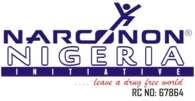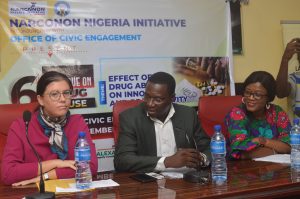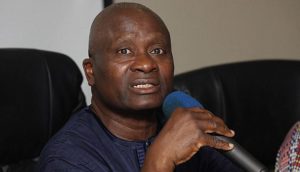“On this International Day against Drug Abuse and Illicit Trafficking, I call on countries and communities to continue to improve the lives of everyone blighted by drug abuse by integrating security and public safety with a heightened focus on health, human rights, and sustainable development.”
By Resolution 42/112 of December 7, 1987, the General Assembly decided to observe June 26 as the International Day against Drug Abuse and Illicit Trafficking as an expression of its determination to strengthen action and cooperation to achieve the goal of an international society free of drug abuse. The theme for this year was, “Listen First!” As part of the commemoration for 2016, Radio Nigeria on July16, 2016, hosted three guests on its audience participation network programme, “Radio Link”, to discuss the challenge of illicit drug trafficking and abuse.
The guests were the Chairman/Chief Executive Officer of the National Drug Law Enforcement Agency, Col. Muhammad Mustapha Abdallah (retd.); Country Representative of the United Nations Office on Drugs and Crime in Nigeria, Ms. Cristina Albertin and a medical practitioner in Abuja, Dr. Tayo Daramola. For the two-hour duration of the programme, I listened with rapt attention as the analysts painted a scary picture of the menace in Nigeria. Incidentally, that same day, I finished reading “The Cobra”, Frederick Forsyth novel on how to wage war against illicit drug trafficking.
According to UNODC, “Drug trafficking is a global illicit trade involving the cultivation, manufacture, distribution and sale of substances which are subject to drug prohibition laws.” Among the prominent drugs being trafficked are Methamphetamine, Amphetamines, Cannabis, Heroin, Opium, Cocaine, Ecstasy and Hallucinogens. This illicit trade worth billions of dollars is very lucrative for the barons who use every conceivable means of transport including airplanes, ships, animals, catapults, sandbag bridges, tunnels and human beings (mules) to move their dangerous wares around the world. These drugs, despite not being cheap, are in high demand universally hence the constant supply by the unscrupulous businessmen who trafficked them.
According to the 2015 World Drug Report, it is estimated that a total of 246m people – slightly over five per cent of those aged 15 to 64 years worldwide – used an illicit drug in 2013. Some 27 million people are problem drug users, almost half of whom are people who inject drugs. An estimated 1.65 million of people who inject drugs were living with HIV in 2013. This year’s World Drug Report notes that men are three times more likely than women to use cannabis, cocaine or amphetamines, whereas women are more likely than men to engage in the non-medical use of opioids and tranquilisers. Additional findings point to high level of drug use in prison, including the use of opiates and injecting drug use.
In Nigeria, the rate of drug abuse is alarming! Youths, ages 13 – 35, are reportedly more involved in drug abuse. Sadly, housewives have also allegedly caught the bug with many of them indulging in the intake of psychoactive substances such as cannabis. Some drug addicts even sniff pit latrines or gutter or take excess codeine in order to feel high. People use hard drugs for many reasons. Experts said adolescents have reported that they experimented with marijuana to enhance sexuality; to feel more confident; for pleasure and relaxation; to make themselves more comfortable in social situations; to understand themselves better; for acceptance by their peers; to achieve elevated social status; to defy authority; and to expand their minds.
Drug abuse is a self-destructive habit. Those involved easily get addicted. According to Daramola, substance abuse affects all organs of the body from kidney to liver to heart. It can lead to memory loss and depression of the central nervous system. It can also predispose the abusers to domestic and road accidents, likewise stealing and job loss. It can also lead to mental disorder as well as negatively affects the abusers social interaction. It has equally truncated the careers of many promising and talented sports personalities and entertainers. It is thus a super destroyer!
The Federal Government recognises early enough the dangers posed by substance abuse and thus set up agency to fight the menace. According to NDLEA, Nigeria flagged off its narcotic control efforts in 1935 when the Dangerous Drugs Ordinance was enacted to control drug trafficking and abuse. In 1984, Nigeria recorded another landmark effort when the Federal Military Government promulgated the Special Tribunal (Miscellaneous Offences) Decree No. 20 of 1984 to frontally confront drug trafficking within the Nigerian shores. Section 3 (2) (K) of the Decree provided that “any person who, without lawful authority deals in, sell, smoke or inhale the drug known as cocaine or other similar drugs shall be guilty under section 6 (3) (K) of an offence and liable on conviction to suffer death sentence by firing squad. In view of the fact that the drug menace continued to rise in profile, Decree No. 48 of 1989, now an Act of Parliament CAP N30 Laws of the Federation of Nigeria 2004, establishes a new body, independent of other existing law enforcement agencies in the country called the National Drug Law Enforcement Agency.
Though the agency has recorded tremendous success in terms of arrests and prosecution of drug traffickers, particularly at our airports, seaports and hinterland. However, the NDLEA is highly incapacitated in terms of dearth of manpower and equipment. The agency has below 5,000 workforce spread over 48 commands across the country. It therefore cannot deploy effectively to man our thousands of legal and illegal international borderentry points. It was reported that a paltry N91m was earmarked for the agency in 2016 budget. The slow pace of Nigeria’s judicial process coupled with lack of diligent prosecution by the NDLEA lawyers are also some of the extant challenges faced in the war against illicit drug trafficking and abuse.
The way forward for Nigeria, experts have said, are as follows: The need to decriminalise drug abuse. By this, instead of sentencing drug addicts to prison terms, they should rather be sent to rehabilitation centres to wean them off their addiction and affliction. Two, there is a need for massive and sustained public sensitisation against drug trafficking and abuse so that those who indulge in them can begin to see the harmful effects of their habit. It is noteworthy that these two have been linked to terrorism. For instance, proceeds of illicit drug trafficking have been traced to terrorism financing while many people who engage in crimes and criminality are known to have perpetrated such heinous acts under substance influence be it alcohol or hard drugs.
Third, there is a need to fasten the prosecution of those caught for illegal drug trafficking. Special courts or tribunals established for that purpose have been advocated. Fourth, the country needs standard rehabilitation centres. At present, there is reportedly none and psychiatrist wards of hospitals are also doubling as rehabilitation centres. This is not ideal. Fifth, better funding of the NDLEA is desirable to enable the agency perform its statutory responsibility effectively and efficiently.
Source: The PUNCH




